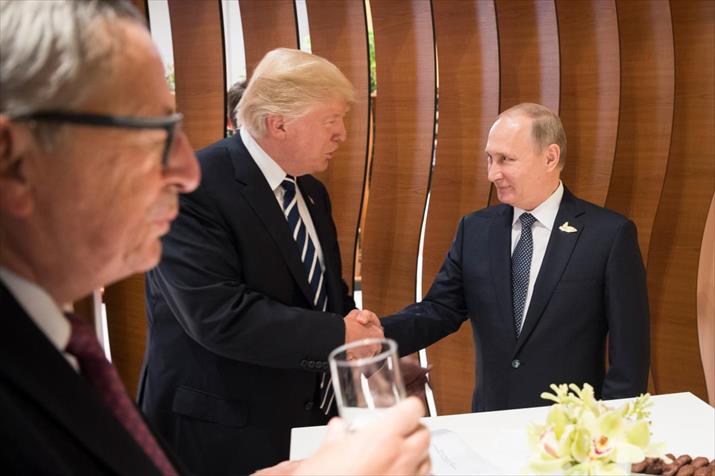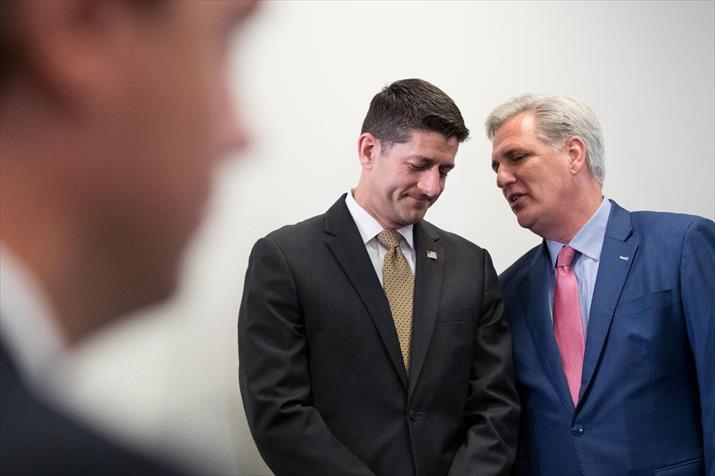| Opinion |
| Business as Usual | |
| Wall Street-pocketed U.S. legislature continues the nation's imperialist crusade | |
|
|
 U.S. President Donald Trump meets with his Russian counterpart Vladimir Putin for a closed door conference on the sidelines of the G20 summit in Hamburg of Germany on July 7 (XINHUA)
The hysteria in Washington over Russia, North Korea and Iran has produced unilateral sanctions legislation with no standing in international law. Sanctions are a form of economic warfare. To be recognized by international law, they must be approved by the United Nations Security Council. This latest round of restrictions has not been so approved. Moreover, the new U.S. sanctions target not just three countries, they extend extraterritorially to Europe and indeed to the globe. The exact repercussions around the world have yet to become known and felt. Some Europeans, though, are already in revolt. Under the U.S. Constitution, the president has the primary responsibility for the formulation and conduct of foreign policy. The Senate gives its advice and consent on various appointments, such as ambassadors, and also on various treaties and international agreements. The House holds the purse strings, so it can have a certain influence. But by law, the president is in charge. Yet, the sanctions legislation has provisions to block the president from removing sanctions. This blatant interference with presidential powers is seen by some experts as going against the "separation of powers" doctrine underlying the U.S. Constitution, according to which, the executive, legislative, and judicial powers are to be separate and balanced.  U.S. House Speaker Paul Ryan (second right) attends a press conference after lawmakers voted 419-3 to approve the bill to sanction Russia, Iran and North Korea on July 25 (XINHUA)
Elite-promoted sanctions Behind the scenes, the dominant U.S. elite linked to Wall Street promoted the sanctions. The vote tallies—419-3 in favor in the House of Representatives, 98-2 in favor in the Senate—demonstrate the power the Wall Street-controlled establishment has over Congress. Despite the apparent complexity of the issues, the establishment's goal is a simple one related to the organization and functioning of the international system. The U.S. and European elites want to maintain the so-called "U.S.-led order," which is a euphemism for maintaining the global hegemony of Western finance capitalism. This system is stratified, hierarchical and dominated by the West. Western elites consider this transatlantic capitalist fortress the center of their world system and seek to draw the periphery under its domination through the usual instruments of coercion, debt and war. Their interpretation of globalization is that it will enforce this feudal end state. Of course, globalization, as viewed by much of the international community, does not mean countries must jettison their own political and economic systems. Still less does it mean member states should merge into some hegemonic world system dominated by transatlantic elites. Globalization should be inclusive and sustainable, respecting state sovereignty and international law. What is going on behind the scenes, as reflected in the U.S. sanctions legislation, is an attempt to block any constructive U.S. relations with Russia. This is part of a design to block constructive win-win cooperation between the major powers. If relations with Russia are blocked, it therefore becomes impossible to organize constructive cooperation between the U.S. and Russia and China. Major power cooperation on a win-win basis overturns the designs of the transatlantic elites for Western hegemony. Thus, we have the campaign against Russia and the secret Western collaboration for an anti-Russia coup d'état and the civil war in Ukraine. Great power cooperation on such geopolitical challenges as the Korean Peninsula, the Middle East and Ukraine is vitiated by the sanctions. That is, of course, the objective of those on Wall Street and in Washington who control the levers of national power to the advantage of finance capitalism and imperialism. History revisited This is not a recent phenomenon in world history. The English economist John A. Hobson wrote extensively about this many decades ago in a classic work entitled Imperialism. Explosive regions are often referred to as conflict zones or zones of instability. Without major power cooperation to manage the dynamics of such zones, regional wars can expand and then draw the major powers themselves into conflict. World War I is an example, as it was triggered in the unstable Balkan region that the great powers of the day had not effectively managed through diplomacy. Without such diplomacy, war was inevitable as the situation deteriorated. U.S. politicians are oblivious to history and any lessons to be learned from it, to the complexities of foreign cultures and international politics, and to the varied national characteristics within the international community. Cartoonish American politicians view the world in Punch and Judy terms. Economic sanctions, various forms of coercion and war are ways to punch your opponent, whether real or imagined. Back in 1964, a delusional Congress passed the Gulf of Tonkin Resolution, which pushed the country into the unnecessary Vietnam War catastrophe. The votes were 416-0 in the House of Representatives and 88-2 in the Senate. Sounds familiar? That legislation was based on a lie from the executive branch about a North Vietnamese attack on a U.S. ship. The attack in question never happened, but Congress fell for the lie. Sounds familiar? Congressional hysteria surrounding the sanctions legislation centers on alleged Russian interference in the U.S. elections of 2016. But intelligence community veterans say the claims are not true. They say that the supposed hacking of the Democratic National Committee (DNC) did not happen, a disaffected staffer at the DNC leaked the data. Congressional hysteria accuses Iran of not adhering to the agreement on nuclear activity. But many experts say that Iran is fulfilling its duties. Additionally, five other countries are involved in the agreement that the U.S. Congress wants to tear up. Congressional hysteria against North Korea blocks effective international diplomacy to resolve the situation on the peninsula. President Trump has not yet brought order to a dysfunctional White House in disarray. Part of his problem is that he allowed his administration to be staffed by many establishment types. He mishandled the appointments of national security advisor (NSA) and secretary of defense by appointing hawkish establishment generals opposed to the foreign policy goals he stated during the campaign. NSA General H.R. McMaster's geopolitical views are well known. He believes that Russia and China are so-called "revisionist" powers who are not satisfied with the present hegemonic "U.S.-led" system. Thus, he advises the president to impose hegemony by all means: war, sanctions and coercive diplomacy. EU takes a hit Needless to say, European leaders and key business people oppose the unilateral U.S. sanctions. They see the implications for extraterritorial application hitting their own financial, commercial and industrial interests. The oil and gas sector is particularly sensitive, as it involves major supply and transport interconnections with Russia. Some Europeans are starting to understand that the sanctions against Russia and Iran are also aimed against European business and strategic interests. It is slowly dawning on them that the sanctions are designed in such a way as to reinforce U.S. hegemony over Europe. So, this logically poses problems for those Europeans with power and privilege who have in the past advocated cooperation with the U.S. A possible split within the transatlantic elites is now underway. This will have geopolitical consequences if the pro-Russia and Iran trade factions win out. Additionally, this can spur renewed interest in commercial, financial, and transportation linkages with China on a Eurasian basis. Taken altogether, such increased economic and diplomatic links would result in a diminished global position for the U.S. Can leaders of major powers permit the delusional U.S. Congress cowboys to disrupt international relations and global trade? The author is an op-ed contributor to Beijing Review and a former senior professional staff member of the U.S. Senate Foreign Relations Committee Copyedited by Chris Surtees Comments to liuyunyun@bjreview.com |
|
||||||||||||||||||||||||||||||
|